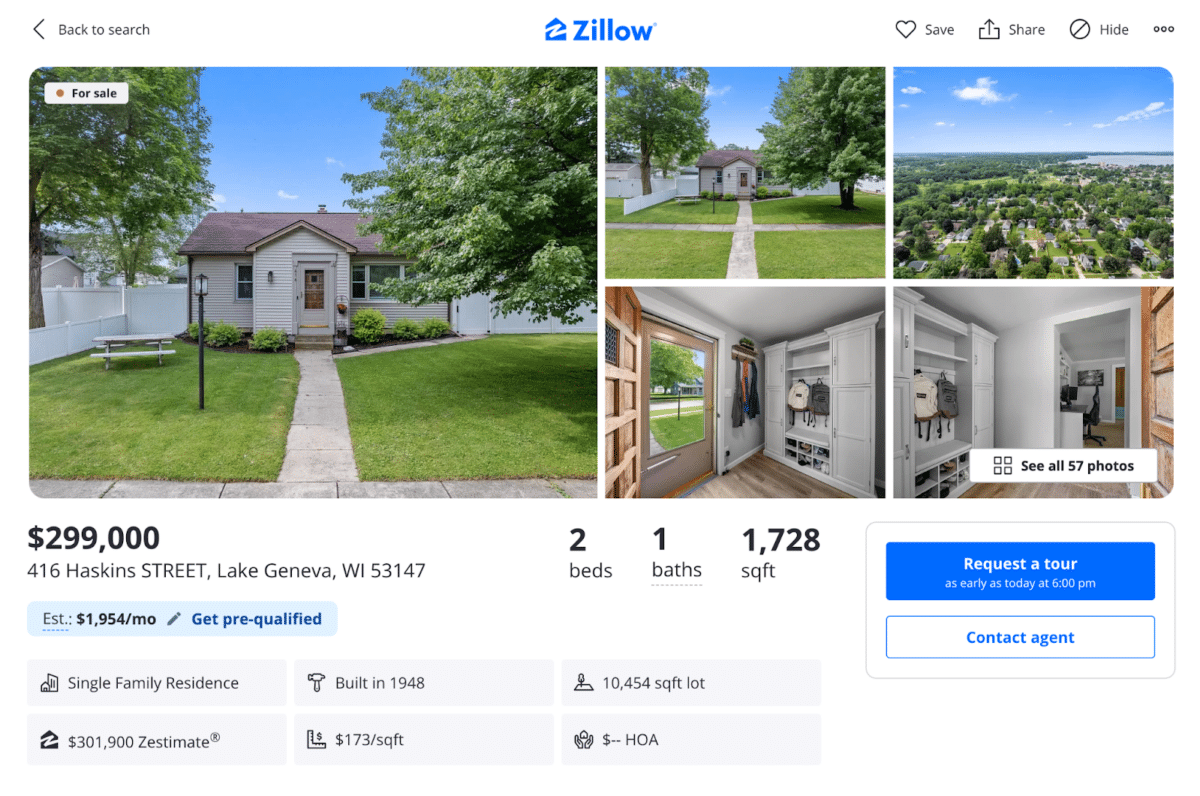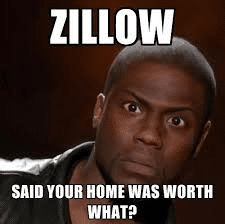Working in real estate means you’ve probably had your fair share of Zillow Zestimate conversations, right? The most common question is, “How accurate is Zestimate?” Whether you’re a fan or not, the Zestimate is definitely a big part of our business. We’ve all had that call from an excited homeowner or had to dive into the details with a buyer who wants to undervalue. But rather than fight against it, use it as a tool. Join me as I demystify the accuracy of Zestimate and share some strategies to chat with your clients about it.
Key Takeaways:
- Zillow uses proprietary technology to estimate a home’s market value.
- The nationwide median error rate for on-market homes is 2.4%, and that of off-market homes is 7.74%.
- On-market data is based on listing price, description, comparable homes in the area, and days on the market.
- Tax assessments, prior sales, and other publicly available records determine off-market data.
What is the Zestimate & How Does Zillow Get It?
The Zestimate is a home valuation based on a sophisticated algorithm that considers many factors and data points and is delivered in real-time for both on- and off-market properties. However, it’s important to note that a Zestimate is not the same as an appraisal conducted in person by a trained professional. When a property is evaluated in person, considering all data points, the condition of the property, and any upgrades, it will be the more accurate valuation.
According to Zillow, there is a method to the madness regarding the Zestimate, which includes a “nationwide median error rate.” For on-market homes, the error rate is 2.35%, and for off-market homes, it’s more than three times that, at 7.74%. Zillow breaks it down even further and shows the percentage of properties within 5%, 10%, and 20% of the sale price.
| *Data compiled from Zillow Zestimates | |||
These numbers show that the Zestimate is generally good at getting within 20% of the market price, gets within 10% a little more than half the time, and only gets within 5% a third of the time. Roughly 20% of properties are off by 20% or more. This discrepancy is real money clients might be leaving on the table—or expecting to pocket.
Variations to Consider
- On-market: Zestimates are based on listing price, description, comparable homes in the area, and days on the market.
- Off-market: Zestimates are determined by tax assessments, prior sales, and other publicly available records.
- Geographical: State-by-state data varies in accuracy. The Zestimate in West Virginia, for example, misses the sale price by more than 20%, nearly a third of the time. Properties in western states, like Utah and Nevada, are within 5% almost half the time.
- Planned communities: They tend to have more accurate Zestimates because the properties are much more homogeneous, making it easier to calculate accurate comps.
How Is a Zestimate Calculated?
A property’s Zestimate is calculated by complex software using an “automated valuation model” that analyzes data points collected from users, public records, and multiple listing services. According to Zillow, here’s what goes into that equation:
- Recent comps (geographic area can be as large as an entire county)
- Home features (bedrooms, bathrooms, and more)
- Physical attributes (square footage, acreage, and more)
- Historical data
- Tax assessments
- MLS data
- Listing price
- Market trends (and seasonality)
- Public data
- User-submitted data
Zillow constantly tweaks and improves its algorithm, and the information input can change over time. For example, it used to be that Zillow didn’t include listing price data, but now it does. Additionally, not all MLSs participate in Zillow’s massive data collection. This results in a much more limited data set, further skewing a Zestimate, so understanding your MLS’s relationship with Zillow is also important.
Are Zestimates Accurate?
There is often a debate about the accuracy of the Zillow Zestimate, and we’ve all seen the jokes. But as much as some real estate agents claim the Zestimate is completely inaccurate, it’s not that cut-and-dry. As a real estate agent, I have learned to use the Zestimate as a guide to help my clients better understand their home value. Let’s break it down further to answer whether Zillow is accurate.
Zestimate accuracy can fluctuate depending on the data Zillow has access to. The listings on Zillow get updated when information is publicly available. So, for instance, if a homeowner makes improvements to their property, this will increase its value. However, unless the local property tax authority adds that information to the public database, Zillow does not know there have been updates, and therefore the Zestimate would be skewed.

Where Zillow shines is in the on-market Zestimates, which are based on the list price data and are far more accurate than the off-market Zestimates. However, neither compares to a custom comparative market analysis (CMA) from an experienced real estate agent. In any case, a Zestimate is great to use as a starting point and could even be a catalyst for someone’s decision to hire a top-notch real estate agent.
Pro tip: Sellers typically already have a perception of what they think their home is worth, often due to the Zestimate, so don’t avoid talking about it. Add a section to your listing appointment checklist that touches on the Zestimate, and use that time to explain it further.
Strategies for Talking to Clients About a Zestimate
Believe it or not, the Zestimate has existed for almost 20 years. It launched in 2006 and evolved over time. By this point, the general public has a better understanding that the true value of their home cannot be determined by the Zestimate alone. And while this may be the case, answering “Is Zillow accurate?” is still something we, as real estate agents, have to battle with occasionally.
We still have clients who use the Zestimate to support an inflated listing price or devalue a home they want to buy, leaving you to answer, “How accurate is Zestimate?” Let’s discuss ways to combat seller objections and leverage the Zestimate with your knowledge.
Strategy 1: Use Your Data
When conducting your listing presentation, this is your chance to show why you are confident in your listing price. Walk the seller through your customized CMA and compare it to the Zestimate to help give the seller a complete picture of accurate pricing. This is a good time to explain how a Zestimate is calculated and why variances exist.
Pro tip: If you are getting a lot of pushback from the seller because their Zestimate is different from your suggested list price, offer to test the market with the Zestimate price as a pocket listing for a specific period of time.
Strategy 2: Apply Your Local Expertise
You know your local community better than Zillow does. Use this expertise to illustrate how your price considers new zoning, a great new donut shop coming in around the corner, whether you’ll need flood insurance, or that buyers paid more for the neighbor’s house because it had a brand-new HVAC system. You have the advantage of proximity. Remind your clients that when making giant financial life decisions, it’s OK to back away from a computer and rely on an actual human being.
Strategy 3: Show Proof of the Inaccuracies

To paint a full picture, it’s important to acknowledge and discuss the potential inaccuracies that can come with the Zestimate. Our clients hire us to help them sell their homes for the highest and best price in the fastest timeframe possible. Pull some examples of Zestimate inaccuracies and explain why that can happen. Remind your clients that a home is only worth what a buyer is willing to pay and that sold homes reflect that accurately.
Strategy 4: Practice With a Script
Feeling comfortable having difficult conversations with clients comes with time and experience. If you’re unsure how to approach a discussion about the Zestimate, try this script.
I know you don’t want to undervalue your home, and online estimates, like Zestimates, can be attractive. But here’s the thing—those estimates don’t always reflect the local market or take into account your home’s unique value, and they can be misleading.
My CMA is based on in-depth research of the local area, current market trends, and years of local expertise. It’s designed to help you price your home strategically so you can sell quickly and for the best possible price.
I know it’s hard to hear your home might not match an online estimate, but my goal is to be your advocate and help you get the best outcome. I’m not trying to undervalue your home, but I want to make sure it’s priced right for this market.
Let’s review my CMA together and discuss a pricing strategy that positions your home for success. I’m confident we can agree on a price you’re comfortable with and that attracts serious buyers.
Remember, the longer a home sits on the market, the harder it becomes to sell. Let’s work together to price it right from the start and get you moving forward.
How is the Zestimate helpful?
While there are many reasons real estate agents don’t like battling the Zestimate or constantly answering, “Is Zillow accurate?” learning to use it as a tool can actually be beneficial.
- The Zestimate is a great conversation starter.
- You can leverage the Zestimate to show your expertise and further dive into the details of a CMA.
- It can be a door opener for new business.
- It can act as a bridge to have difficult conversations, including those about price reductions.
FAQs
Is Zestimate or Redfin more accurate?
There are conflicting answers online as to whether Zillow or Redfin has the more accurate home valuations. However, Redfin has reported a median error rate of 1.98% for on-market homes, making it slightly more accurate than the Zillow Zestimate.
Can a seller change the Zestimate?
Yes, if a homeowner would like to influence the price shown on Zillow, they can do so by editing their home facts. Fixing any incorrect or incomplete information will help get the price as accurate as possible. Information such as architectural style, roof type, heat source, building amenities, and more can also be added.
Bringing It All Together
Embracing technology and tools in the real estate industry is a way to keep evolving your business. Especially since we’ll likely continue to see more tools and tech in years to come. Zillow was ahead of its time when it rolled out the Zestimate. While frequently getting asked, “How accurate is the Zestimate?” and having to defend local market valuation data can still be frustrating to deal with at times, it continues to improve. Consider it part of your market research and use it to your advantage to help educate your clients.












